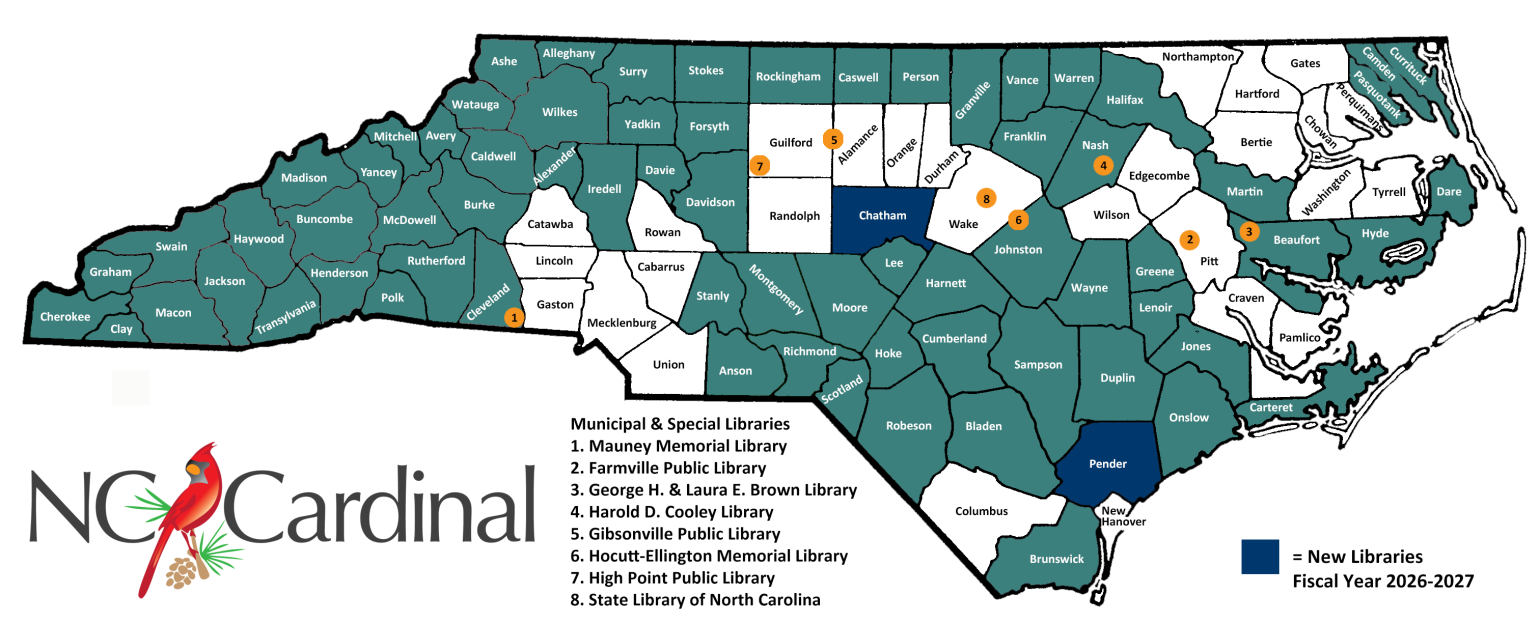NC Cardinal
NC Cardinal was conceived in 2009 and formed in 2010 “to make the combined resources of North Carolina’s public libraries available to all people of the state through a shared catalog and a statewide library card.” In the ten years of its existence, NC Cardinal has broadened its focus to include resource sharing, cost savings, and collaborative collection development for half of the public libraries in North Carolina.

NC Cardinal is a program of the State Library of North Carolina, supported by grant funds from the Institute of Museum and Library Services under the provisions of the Federal Library Services and Technology Act.
Million Items in the Catalog
Checkouts Per Month
(on average in 2024)
Holds Filled Per Month
(on average in 2024)
Physical Branches Throughout NC
Counties throughout NC
Library Systems
8 Regional, 40 County, 7 Municipal, 1 Special

Who We Are





About NC Cardinal
NC Cardinal is a consortium of North Carolina public libraries that share an online catalog and integrated library system (ILS), and share resources with other member libraries. The program’s mission is to maintain and continually develop a working, efficient, and sustainable ILS for public libraries and library staff within North Carolina. It is a program of the State Library of North Carolina, supported by grant funds from the Institute of Museum and Library Services under the provisions of the Federal Library Services and Technology Act. The State Library of North Carolina supports this consortium by providing initial startup/migration funding to join the consortium and after migration, funding for State Library consultants to facilitate system support, workshops, training, project management guidance, and consortium oversight on a variety of cataloging and circulation issues. NC Cardinal has been operating since July 2010.
The State Library’s goals for the project are:
- to provide an alternative to higher-priced third-party ILS vendors
- to facilitate resource sharing among participating libraries
- to enable public libraries to re-allocate their monies from financially supporting an ILS to other, patron-focused needs
- to more effectively and efficiently support library patron needs between participating libraries, expanding their library use due to greater offerings and services
- to create a single vision for North Carolina libraries that have varying policies and workflows
Consortium Advantages
One of the most exciting aspects of NC Cardinal is the sharing of items across our state. More than 80,000 items move among the member libraries each month. Resource sharing, which launched in February 2013, has had two immediate impacts on patrons: (1) member libraries have seen hold request wait times cut from an average of 6.5 days to 1.8 days, and (2) patrons now have access to numerous materials they previously didn’t. Daily, NC Cardinal libraries pull a list of hold requests from the ILS, package these items, and ship them to their partner libraries in the consortium through a shared shipping account. Patrons of member libraries enjoy this service at no cost.
One of the most practical advantages to being part of the NC Cardinal consortium is the leveraging of LSTA funds to improve efficiency and provide cost savings to the libraries. All expenses associated with NC Cardinal were initially funded through an LSTA project. A consortium pricing structure is being implemented that will provide sustainability and cost sharing. The cost of joining and the first two years membership in the NC Cardinal consortium is funded. An annual cost share for continued membership is determined based upon the size of the library’s collection and patron base. Under this pricing structure, each library will find annual savings between 30% and 80%, with a median of about 58%, compared to the costs of its previous ILS.
Other NC Cardinal consortium advantages:
- Collaborative collection development
- Open source community-ability to direct and customize ILS system
- Responsibility of ILS support shifted to State Library
- Opportunity for participating in advisory/steering committees by participating in working groups and committees like Governance, Cataloging, and User Experience
Evergreen
NC Cardinal’s ILS system is called Evergreen, an open source ILS used by more than a thousand libraries around the world. Evergreen provides a public catalog interface as well as management back-of-house operations such as circulation, cataloging, reports, acquisition, and sharing resources among groups of libraries.
The Evergreen Project was initiated by the Georgia Public Library System in 2006 to serve its need for a scalable catalog. Evergreen has since been adopted by a number of library consortia and independent libraries in the US and Canada as well as internationally.

